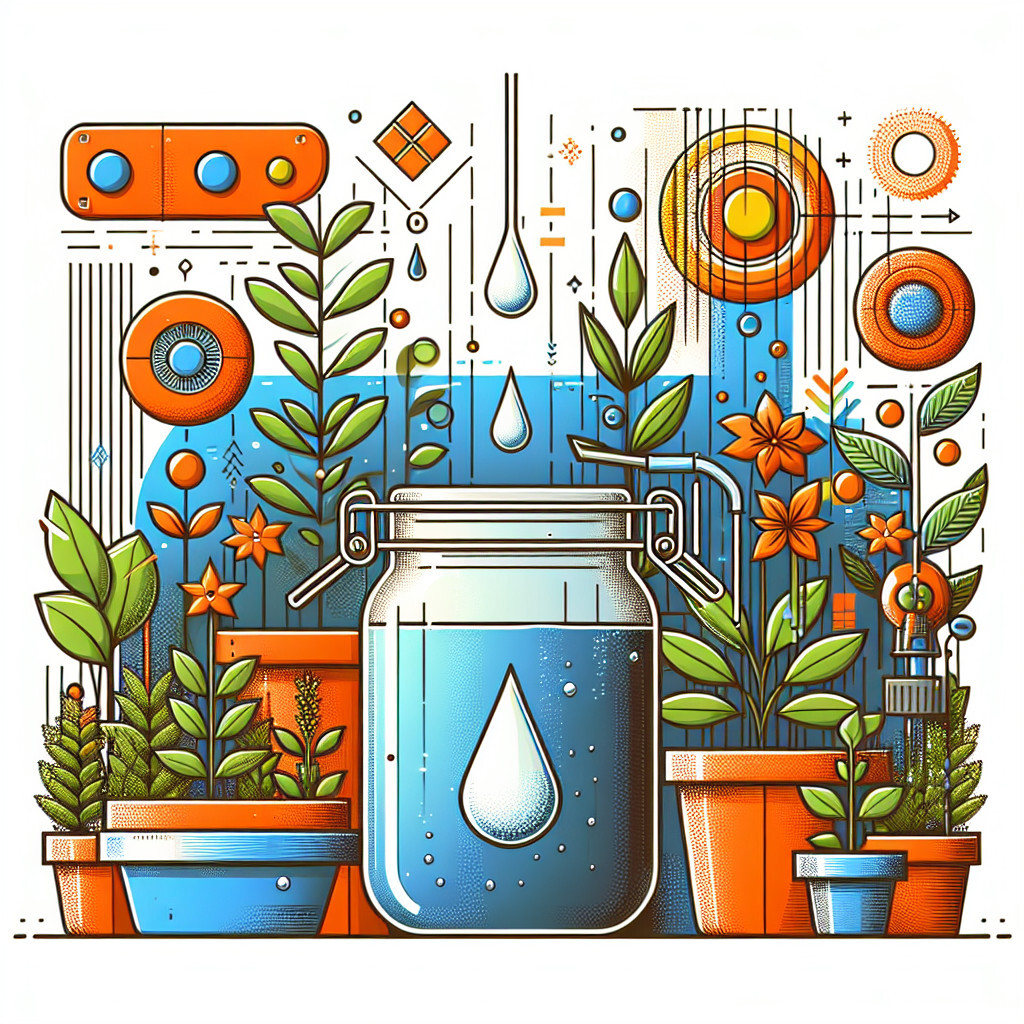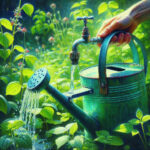-
Table of Contents
“Enrich your tap water, nurture your plants!”
Introduction

Adding certain substances to tap water can significantly improve the health and growth of plants. These substances can range from commercial fertilizers to homemade compost teas, and they can provide essential nutrients that tap water alone may lack. Additionally, some gardeners also add substances to neutralize chlorine and other chemicals commonly found in tap water that can be harmful to plants. The choice of what to add depends on the specific needs of the plant species, the quality of the tap water, and the gardener’s personal preferences.
The Essential Nutrients to Add to Tap Water for Healthier Plants
Water is a fundamental requirement for plant growth, but tap water can often be a source of plant health problems. It’s not that tap water isn’t safe for plants, but it often contains chlorine, which can be harmful to them. Moreover, tap water doesn’t contain the nutrients that plants need to thrive. Therefore, it’s essential to know what to add to tap water for plants to ensure their optimal growth and development.
Firstly, it’s crucial to understand that plants require a range of nutrients to grow healthily. These nutrients are typically divided into two categories: macronutrients and micronutrients. Macronutrients include nitrogen, phosphorus, and potassium, often referred to as NPK. These are the primary nutrients that plants need in large amounts. Nitrogen promotes leaf and stem growth, phosphorus aids in root development and flowering, while potassium helps with overall plant health.
Micronutrients, on the other hand, are needed in smaller amounts but are still vital for plant health. These include elements like calcium, magnesium, and iron. Calcium aids in cell wall development, magnesium is a component of chlorophyll, and iron helps in the production of chlorophyll.
To provide these essential nutrients to your plants, you can add a balanced plant fertilizer to your tap water. These fertilizers are typically available in liquid, granular, or powdered forms and contain a mix of the necessary macronutrients and micronutrients. It’s important to follow the manufacturer’s instructions when using these fertilizers to avoid over-fertilization, which can harm your plants.
Another way to enhance the nutrient content of your tap water is by adding compost tea. Compost tea is a nutrient-rich liquid made by steeping compost in water. It’s an excellent way to provide your plants with a wide range of nutrients and beneficial microorganisms. To make compost tea, simply add compost to a bucket of water, let it steep for a few days, then strain the liquid and use it to water your plants.
In addition to nutrients, plants also need a suitable pH level to absorb these nutrients effectively. Most plants prefer a slightly acidic to neutral pH level, around 6.0 to 7.0. Tap water, however, can often be slightly alkaline. Therefore, it may be necessary to adjust the pH level of your tap water. This can be done by adding a pH adjuster, such as vinegar to lower the pH or baking soda to raise it.
Lastly, it’s important to let tap water sit for a while before using it to water your plants. This allows the chlorine, which can be harmful to plants, to evaporate. Alternatively, you can use a water conditioner, which neutralizes chlorine and makes tap water safer for plants.
In conclusion, while tap water can be used for watering plants, it’s often necessary to add certain nutrients and adjust its pH level to ensure optimal plant health. By adding a balanced plant fertilizer or compost tea, and adjusting the pH level if necessary, you can significantly improve the quality of your tap water for plants. Remember to let your tap water sit for a while before using it, or use a water conditioner, to neutralize any chlorine present. With these simple steps, you can provide your plants with the best possible growing conditions.
How to Improve Your Tap Water for Indoor Plant Growth
Indoor gardening has become increasingly popular, especially among urban dwellers who lack outdoor space. However, one of the challenges that indoor gardeners face is providing their plants with the right kind of water. Tap water, which is often used for watering indoor plants, may contain chemicals and minerals that can harm the plants. Therefore, it is essential to know what to add to tap water for plants to ensure their optimal growth.
Firstly, it is important to understand that tap water often contains chlorine, a chemical used to kill bacteria and other microorganisms. While this is beneficial for human consumption, it can be harmful to plants, especially sensitive ones. To remove chlorine from tap water, simply let the water sit in an open container for about 24 hours. This allows the chlorine to evaporate, making the water safer for your plants.
In addition to chlorine, tap water may also contain high levels of minerals like calcium and magnesium, which can build up in the soil and affect the plant’s ability to absorb nutrients. To address this, you can add vinegar or lemon juice to the water. These substances are acidic and can help neutralize the alkalinity caused by the minerals. However, be careful not to add too much as it can lower the pH level of the water too much, which can also be harmful to plants.
Another substance that can be added to tap water for plants is hydrogen peroxide. This compound helps to oxygenate the water, promoting healthier root systems and overall plant growth. It also helps to kill any harmful bacteria or fungi that may be present in the water. A small amount of 3% hydrogen peroxide solution added to the water can make a significant difference in your plant’s health.
For those who want to provide their plants with additional nutrients, adding a water-soluble fertilizer to the tap water can be beneficial. These fertilizers contain essential nutrients like nitrogen, phosphorus, and potassium, which are necessary for plant growth. However, it’s important to follow the manufacturer’s instructions to avoid over-fertilization, which can damage the plants.
Lastly, using filtered water can also be beneficial for indoor plants. While this may not be a practical solution for everyone due to the cost of water filters, it can significantly improve the quality of the water by removing harmful chemicals and minerals. If you choose to use filtered water, remember to still let it sit for a while before using it to water your plants, as some filters may not remove all the chlorine.
In conclusion, while tap water is a convenient source of water for indoor plants, it may not always be the best option due to the presence of harmful chemicals and minerals. By taking a few simple steps such as letting the water sit to remove chlorine, adding vinegar or lemon juice to neutralize minerals, using hydrogen peroxide to oxygenate the water, adding a water-soluble fertilizer for extra nutrients, or using filtered water, you can significantly improve the quality of your tap water for your indoor plants. Remember, healthy water leads to healthy plants.
The Role of pH Balancers in Tap Water for Plant Nourishment
Water is a fundamental requirement for plant growth, but tap water can often contain high levels of minerals that can harm plants. One of the most critical aspects to consider when using tap water for plants is the pH level. The pH level of water can significantly impact a plant’s ability to absorb nutrients, and therefore, it plays a crucial role in plant nourishment.
The pH scale ranges from 0 to 14, with 7 being neutral. Anything below 7 is considered acidic, while anything above is alkaline. Most plants prefer a slightly acidic environment, with a pH level between 6 and 7. However, tap water often leans towards the alkaline side of the scale, which can lead to nutrient lockout, preventing plants from absorbing the nutrients they need.
To counteract this, pH balancers can be added to tap water to adjust its pH level. These balancers are available in both liquid and powder form and can be easily found in garden centers or online. They work by neutralizing the pH level of the water, making it more suitable for plant absorption.
Before adding a pH balancer, it’s essential to test the pH level of your tap water. This can be done using a pH testing kit, which is also readily available in garden centers or online. Once you know the pH level of your tap water, you can determine how much pH balancer to add.
Adding a pH balancer to tap water is a relatively straightforward process. Simply follow the instructions provided on the packaging of the pH balancer. Typically, you would add a certain amount of the balancer to your water, stir or shake it, and then leave it to settle for a few minutes. After this, you should test the water again to ensure the pH level is now within the desired range.
However, it’s important to note that while pH balancers can help adjust the pH level of tap water, they do not remove the minerals that can build up in the soil over time. Therefore, it’s also beneficial to occasionally water your plants with distilled or rainwater, which is naturally free of these minerals.
In addition to pH balancers, there are other substances you can add to tap water to make it more plant-friendly. For example, adding a small amount of vinegar or lemon juice to the water can help lower its pH level. Alternatively, baking soda can be used to raise the pH level if it’s too low.
Furthermore, some gardeners recommend letting tap water sit out for 24 hours before using it to water plants. This allows chlorine, a common additive in tap water that can harm plants, to evaporate.
In conclusion, while tap water can be used for watering plants, it’s important to consider its pH level and mineral content. By using pH balancers and other additives, you can adjust the pH level of tap water to make it more suitable for plant nourishment. However, remember to occasionally use distilled or rainwater to prevent mineral buildup in the soil. With these considerations in mind, tap water can be a viable option for keeping your plants healthy and well-nourished.
Using Organic Fertilizers in Tap Water for Boosting Plant Health
Water is a fundamental requirement for plant growth, but tap water alone may not provide all the nutrients that your plants need to thrive. This is where organic fertilizers come into play. Organic fertilizers, when added to tap water, can significantly boost plant health by providing essential nutrients that tap water may lack.
Organic fertilizers are derived from natural sources such as plant and animal matter. They are rich in nutrients like nitrogen, phosphorus, and potassium, which are essential for plant growth. When these fertilizers are added to tap water, they dissolve and become readily available for plant uptake. This nutrient-rich water can then be used to irrigate plants, providing them with a balanced diet that promotes healthy growth and development.
One of the most common organic fertilizers to add to tap water is compost tea. Compost tea is made by steeping compost in water for several days, then straining the mixture to create a nutrient-rich liquid. This liquid can be added directly to tap water and used to water plants. Compost tea not only provides essential nutrients but also introduces beneficial microorganisms to the soil, which can help improve soil structure and fertility.
Another popular organic fertilizer is worm castings tea. Worm castings, or vermicompost, are rich in nutrients and beneficial microbes. To make worm castings tea, simply soak worm castings in water for 24 hours, then strain the mixture to obtain a nutrient-rich liquid. This liquid can be mixed with tap water and used to water plants. Like compost tea, worm castings tea can improve soil structure and fertility, promoting healthier plant growth.
Seaweed extract is another organic fertilizer that can be added to tap water. Seaweed is rich in trace minerals and growth hormones, which can stimulate plant growth and improve plant health. Seaweed extract can be purchased in liquid form and mixed with tap water according to the manufacturer’s instructions.
Fish emulsion is also a great organic fertilizer to add to tap water. It is derived from fish waste and is rich in nitrogen, phosphorus, and potassium. Fish emulsion can be mixed with tap water and used to water plants, providing them with a balanced diet of essential nutrients.
While organic fertilizers can significantly boost plant health, it’s important to use them correctly. Over-fertilization can harm plants, so it’s crucial to follow the manufacturer’s instructions when mixing organic fertilizers with tap water. It’s also important to note that different plants have different nutrient requirements, so what works for one plant may not work for another.
In conclusion, adding organic fertilizers to tap water can provide plants with essential nutrients, promoting healthier growth and development. Compost tea, worm castings tea, seaweed extract, and fish emulsion are all excellent choices of organic fertilizers that can be added to tap water. However, it’s important to use these fertilizers correctly and to consider the specific nutrient requirements of each plant. With the right approach, organic fertilizers can significantly boost plant health and productivity, making them a valuable addition to any gardening routine.
Q&A
1. Question: What can I add to tap water to improve plant growth?
Answer: You can add a water-soluble plant fertilizer to tap water to improve plant growth.
2. Question: Is there something natural I can add to tap water for my plants?
Answer: Yes, you can add compost tea or seaweed extract to tap water for a natural nutrient boost.
3. Question: What can I add to tap water to adjust its pH for my plants?
Answer: You can add vinegar to lower the pH or baking soda to raise the pH of tap water for your plants.
4. Question: Can I add anything to tap water to remove chlorine for my plants?
Answer: Yes, you can add a small amount of vitamin C to tap water to neutralize chlorine. Alternatively, letting tap water sit out for 24 hours can also allow chlorine to evaporate.
Conclusion
In conclusion, adding a small amount of nutrients or fertilizers, such as nitrogen, phosphorus, and potassium, can be beneficial for plants. However, it’s also important to consider the pH level of the tap water. If it’s too high or too low, it may be necessary to add a pH adjuster. Additionally, letting tap water sit out for 24 hours before using can help to dissipate any chlorine that could harm the plants.






